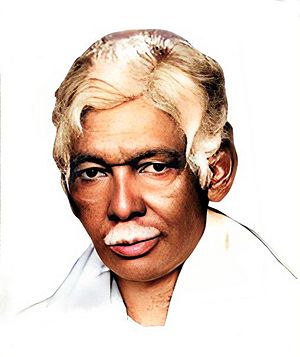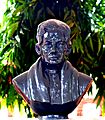Raghunath Murmu facts for kids
Quick facts for kids
Raghunath Murmu
|
|
|---|---|

Portrait of Raghunath Murmu
|
|
| Born | May 1905 Mayurbhanj State, British India (present-day Mayurbhanj, Odisha, India) |
| Died | 1 February 1982 (aged 76) |
| Occupation | Ideologist, playwright, and writer |
| Nationality | Indian |
| Subject | Ol Chiki alphabet |
Pandit Raghunath Murmu (born May 1905 – died February 1, 1982) was an important Indian writer and teacher. He belonged to the Santali community. He created the Ol Chiki script for the Santali language.
Before the 1800s, Santali people did not have their own written language. They passed down stories and knowledge by speaking. Later, European researchers and missionaries started writing Santali using other scripts like Bengali, Odia, and Roman. But the Santali people still wanted their own unique script.
Raghunath Murmu's invention of the Ol Chiki script was a huge step. It helped the Santali people celebrate their culture and identity. He wrote many songs, plays, and school books using this new script.
Contents
Life Story of Raghunath Murmu
Raghunath Murmu was born in May 1905, on a special day called Baisakhi Purnima. His birthplace was Dandbose village in Mayurbhanj State, which is now part of Odisha, India. His parents were Nandlal Murmu and Salma Murmu.
His father, Nandlal Murmu, was a village leader. His uncle worked for the King of Mayurbhanj State. When he was born, he was first named Chunu Murmu. But later, a priest changed his name to Raghunath Murmu.
Early Life and the Ol Chiki Script
When Raghunath Murmu was seven, he started primary school. It was an Odia-language school. He wondered why he had to learn in Odia when his language was Santali. He asked his father why they weren't taught in Santali.
His father explained that Santali did not have a written script; it was only spoken. This made young Raghunath think deeply. He kept asking himself: Why don't we have our own script? Why can't we learn in our own language?
In 1914, he went to Bahalda Primary School. It was far from his home, so he built a small hut near the school. He lived there with other boys. While other children played, Raghunath often played alone. He would draw shapes and letters in the dirt. This was likely when he started creating the Ol Chiki script.
He later moved to Baripada for more studies. Even there, he kept thinking about his language and script. During school breaks, he would go to a quiet jungle called Kapi-Buru. He took his notebook and pen there. It is believed that he finished creating the Ol Chiki script in this jungle in 1925.
In 1928, he finished his high school exams from Patna University. That same year, he married Nuha Baskey.
Creating Santali Books with Ol Chiki
After finishing school in 1928, Raghunath Murmu started working at the Baripada Power House. He also built his own house in Baripada. He later went for industrial training in West Bengal.
After his training, he became a teacher at the Baripada Technical Institute. In 1933, he joined Badamtalia Primary School. People say he sometimes used the Ol Chiki script while teaching. One of his students, a carpenter's son, carved the letters he wrote onto a wooden roller. This allowed them to print the letters on paper.
The first book in Ol Chiki script, called Horh Sereng, was published in 1936. In 1942, he published his first play, Bidu-Chandan. This play told a story about two gods, Bidu and Chandan, who came to Earth. They invented the Ol Chiki script to share their love in written Santali.
The King of Mayurbhanj State saw this play and understood how important the new script was. The first show of Bidu Chandan was performed near his house, which is now known as Master Bari. Many people came to watch it.
Raghunath Murmu also taught at other schools. He visited many Santali villages in Mayurbhanj and Jharkhand. He taught people how to use his new Ol Chiki script. Because of his teaching, people started calling him Pandit Raghunath Murmu, meaning a wise teacher.
During the independence movement in 1942, he was seen as a revolutionary for promoting his script. He went into hiding in his wife's village, Jamjora. There, he continued to develop Santali literature using Ol Chiki script.
After India gained independence in 1947, there was a movement for a separate state called Jharkhand for Santali-speaking people. Raghunath Murmu strongly supported this movement. An arrest warrant was issued for him, so he moved to Karandih village near Jamshedpur.
He worked for Tata Steel in Jamshedpur. With his friend Sadhu Murmu, he spread knowledge about the Ol Chiki script. They taught villagers how to read and write it. He also wrote many books like Parsi Poha and Ol Chemed to help people learn the script.
Honors for His Contributions
Raghunath Murmu spent his later years in his home village. He had traveled his whole life to spread the Ol Chiki script. His mother-in-law took care of his family and home.
In 1956, at a conference in Jamshedpur, a leader named Jaipal Singh gave him the title Guru Gomke. This means the great teacher. He was also honored by the Mayurbhanj State Adivasi Mahasabha with the same title.
His brother-in-law gave him a printing machine. He bought different types of metallic letters from Kolkata. He started printing his books in the Ol Chiki script. A weekly magazine called Saagen Saakam was printed under his guidance. It helped spread Santali literature. He believed that Santali literature could not grow without the Ol Chiki script.
He also helped set up the Baba Tilka Majhi Library. He visited many Santali areas in different states. He taught people the Ol Chiki script through songs. Slowly, he convinced people that the Ol Chiki script was necessary.
He started a non-political group called SECA (Social-Educational and Cultural Association). This group held meetings where people could share their ideas. Some people now worship Bidu and Chandan, characters from his play, as Gods of Knowledge. He set up traditions for praying to them.
Raghunath Murmu wrote over 150 plays, short stories, novels, and poems in Ol Chiki script.
He received many awards for his amazing work. Ranchi University gave him an honorary Doctorate degree. In 1979, the Government of West Bengal honored him with a bronze medal. Other organizations also gave him titles like D.Lit. A professor from the USA called him a Theologian, meaning a spiritual teacher. People loved and respected him most for giving the Santali community its own identity through the Ol Chiki script.
He passed away on February 2, 1982.
Important Works
His most important work was creating the Ol Chiki script. But he also wrote many other significant books for the Santali literature and script. These include:
- Ol Chemed: A primary textbook for learning Ol Chiki script.
- Parsi Poha: About the basic parts of Ol Chiki script.
- Dare Ge Dhon: A drama.
- Sidu Kanhu: A patriotic drama.
- Bidu Chandan: His famous love drama.
- Kherwal Bir: Another patriotic drama.
- Hital: A religious text about the creation of Earth and humans in Santali myth.
- Hor Sereng: A collection of Santali songs.
- Ronor: A Santali grammar book.
- Elkha: A Santali mathematics book.
His first book was Hor Sereng, and his first play was Bidu Chandan. His last book was Rah Andorh.
Legacy and Impact
Raghunath Murmu not only gave the Santali community a new identity but also inspired others. Because of his work, many other communities have started to develop their own scripts.
In 2003, the Government of India added the Santali language to the Eighth Schedule of the constitution. This means Santali is now one of India's official languages. After this, states like West Bengal, Jharkhand, and Odisha recognized Santali. They started teaching Santali in primary and high schools in Santal-dominated areas. Many universities now offer courses in Santali literature using the Ol Chiki script.
In 2016, the chief minister of Odisha declared Pandit Raghunath Murmu's birthday an optional holiday. This day is often called "Guru Kunami" or "Guru Purnima".
Images for kids
See also
 In Spanish: Raghunath Murmu para niños
In Spanish: Raghunath Murmu para niños
 | William M. Jackson |
 | Juan E. Gilbert |
 | Neil deGrasse Tyson |


